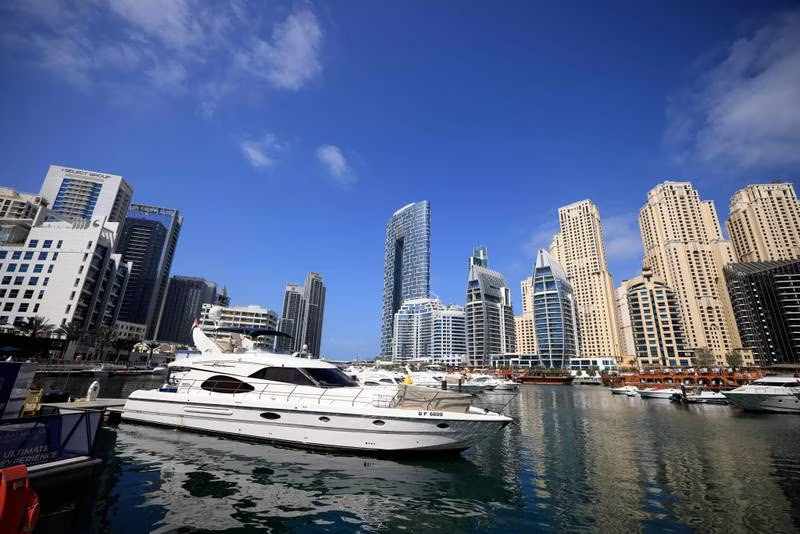Dubai's non-oil economy stays 'robust' after sharpest output expansion in four months

Collected Image
Business activity in Dubai's non-oil private sector economy continued to improve last month as output expanded at the sharpest rate in four months.
The emirate's seasonally adjusted S&P Global purchasing managers' index reading in February slipped to 54.1, from 54.5 in January, but remained well above the neutral 50 mark separating expansion from contraction. Despite the softer pace, the reading “was still indicative of a robust performance for the non-oil sector, as new orders and activity continued to rise sharply”, said David Owen, a senior economist at S&P Global Market Intelligence. “Output growth picked up from January and remained well above the survey trend.”
Businesses attributed output increases to new clients and continuing projects, according to the survey. The construction sector registered its “strongest upturn” in output since June 2019, while wholesale and retail and travel and tourism both registered faster increases in activity, compared with January.
Dubai's economy expanded by 4.6 percent on an annual basis in the first nine months of 2022, with wholesale and retail trade accounting for 24.1 percent of its gross domestic product, according to data from the emirate's statistics center.
Emirates NBD estimates Dubai's full-year 2022 growth at 5 per cent and expects the emirate’s GDP to grow by 3.5 per cent in 2023. The tourism sector, a key component of the emirate's economy, has made a strong rebound from the coronavirus-induced slowdown.
Dubai hosted 11.4 million overnight international visitors in the first 10 months of the year, up 134 per cent from the same period in 2021, according to latest government statistics.
It property market also had a record-breaking year, with further price increases registered in December. The market recorded 90,881 transactions in 2022, exceeding the previous high of 81,182 in 2009, property consultancy CBRE said in its Dubai Residential Market Snapshot report.
Despite expenses rising, companies reduced their output charges to support demand conditions, with costs falling for the seventh month running, although the rate of reduction was modest and the softest since last November.
Non-oil businesses benefitted from an improvement in supplier delivery times, which picked up to hit their highest level since August 2019.
Panellists were also broadly more confident about future activity, with the degree of optimism concerning the next 12 months at its highest since June amid expectations that improving market conditions will support higher activity, according to the survey.
“Businesses were also more optimistic … reflecting confidence that demand conditions will continue to improve and avoid disruption from a weaker global economic climate,” said Mr Owen.
The emirate's seasonally adjusted S&P Global purchasing managers' index reading in February slipped to 54.1, from 54.5 in January, but remained well above the neutral 50 mark separating expansion from contraction. Despite the softer pace, the reading “was still indicative of a robust performance for the non-oil sector, as new orders and activity continued to rise sharply”, said David Owen, a senior economist at S&P Global Market Intelligence. “Output growth picked up from January and remained well above the survey trend.”
Businesses attributed output increases to new clients and continuing projects, according to the survey. The construction sector registered its “strongest upturn” in output since June 2019, while wholesale and retail and travel and tourism both registered faster increases in activity, compared with January.
Dubai's economy expanded by 4.6 percent on an annual basis in the first nine months of 2022, with wholesale and retail trade accounting for 24.1 percent of its gross domestic product, according to data from the emirate's statistics center.
Emirates NBD estimates Dubai's full-year 2022 growth at 5 per cent and expects the emirate’s GDP to grow by 3.5 per cent in 2023. The tourism sector, a key component of the emirate's economy, has made a strong rebound from the coronavirus-induced slowdown.
Dubai hosted 11.4 million overnight international visitors in the first 10 months of the year, up 134 per cent from the same period in 2021, according to latest government statistics.
It property market also had a record-breaking year, with further price increases registered in December. The market recorded 90,881 transactions in 2022, exceeding the previous high of 81,182 in 2009, property consultancy CBRE said in its Dubai Residential Market Snapshot report.
Despite expenses rising, companies reduced their output charges to support demand conditions, with costs falling for the seventh month running, although the rate of reduction was modest and the softest since last November.
Non-oil businesses benefitted from an improvement in supplier delivery times, which picked up to hit their highest level since August 2019.
Panellists were also broadly more confident about future activity, with the degree of optimism concerning the next 12 months at its highest since June amid expectations that improving market conditions will support higher activity, according to the survey.
“Businesses were also more optimistic … reflecting confidence that demand conditions will continue to improve and avoid disruption from a weaker global economic climate,” said Mr Owen.
Source: https://www.thenationalnews.com
Tags :
Previous Story
- Dubai's non-oil private economy continues expansion for ninth...
- Current account surplus for Mena region and Pakistan...
- Saudi Arabia's economy grows 8.6% in third quarter...
- Oil prices rally on news of biggest potential...
- Biden to US oil companies: 'Bring down petrol...
- Oil prices drop to 8-month low on recession...
- Oil rallies after Putin calls up army reserves...
- Oil climbs but posts third weekly loss on...